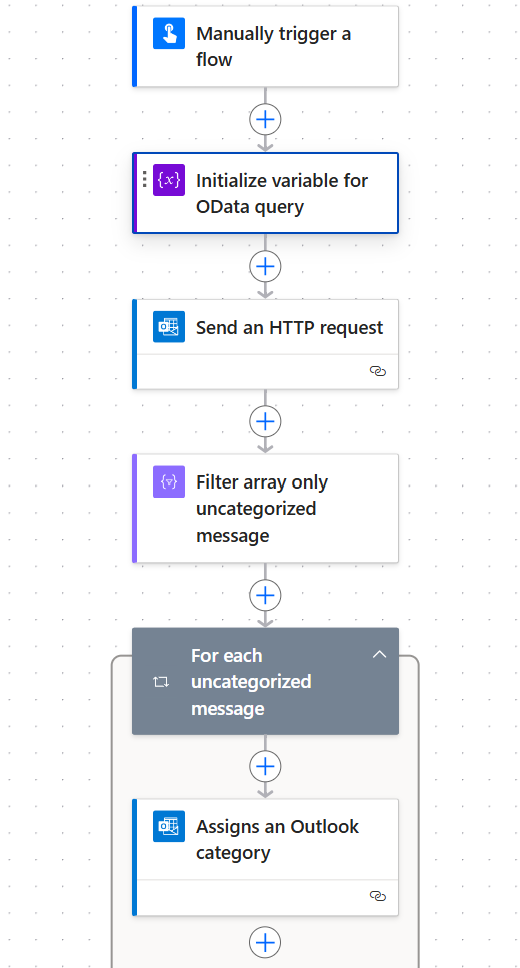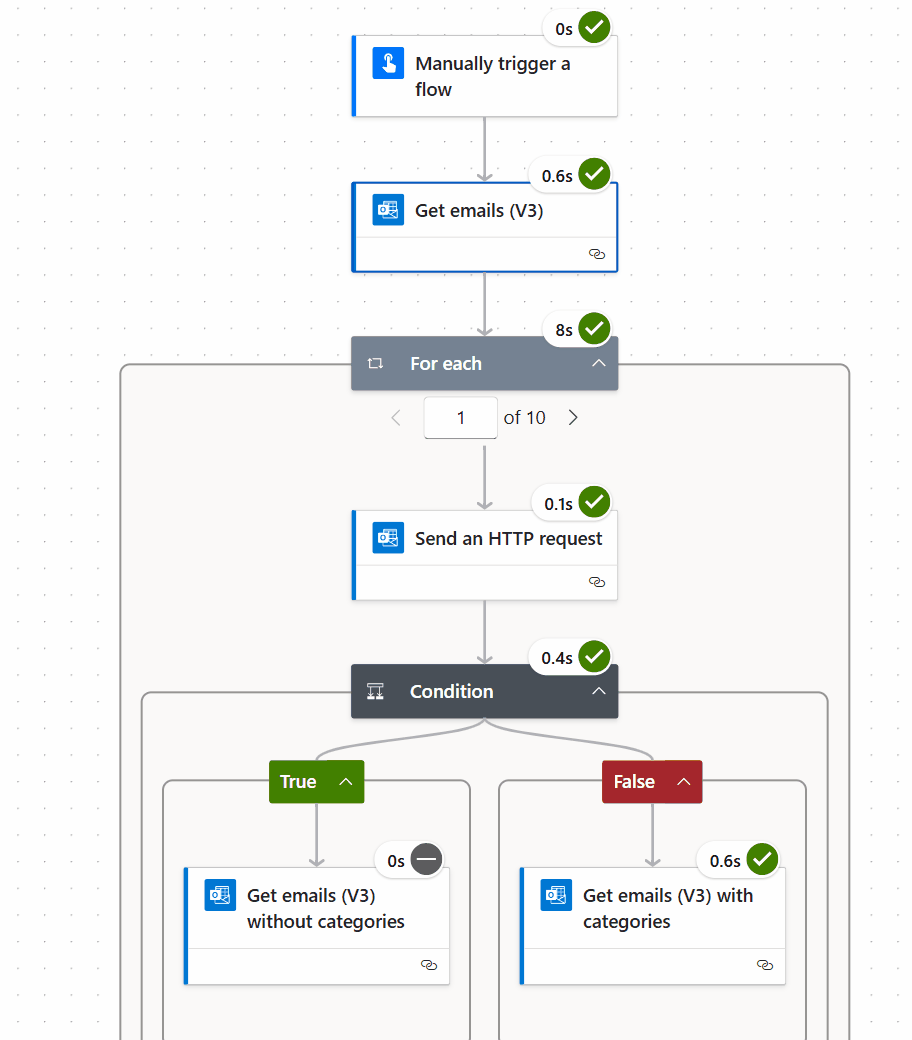In this Article I want to show you how to filter no category email in outlook via Power Automate.
In current Outlook 365 connector, there is no option to filter out emails with/without categories.
When I tried to build the flow, I thought I could use Get emails (V3). After I tried I realised that there is no info in the body, but it doesn’t have the categories information, and the most important thing is it may consume more API if I use it first.
Below is an example of one message structure from Get emails (V3) output body value.
{
"id": "value",
"receivedDateTime": "",
"hasAttachments": false,
"internetMessageId": "",
"subject": "",
"bodyPreview": "Hi...",
"importance": "normal",
"conversationId": "",
"isRead": false,
"isHtml": true,
"body": "html body",
"from": "",
"toRecipients": "",
"attachments": []
},
After check each actions, one option can be used is Send an HTTP request within Outlook 365 connector.combine with Get emails (V3)
Use Send an HTTP request
This action construct a Microsoft Graph REST API request to invoke. These segments are supported:
- 1st segment: /me, /users/
- 2nd segment: messages, mailFolders, events, calendar, calendars, outlook, inferenceClassification
https://graph.microsoft.com/v1.0/me/messages will be the way to go. But I only want to check my inbox and unread messages.
https://graph.microsoft.com/v1.0/me/mailFolders/Inbox/messages/{messageID} will be perfect for me.
For demonstrate purpose,pseudocode as below:
optional, get emails V3
Send an request to query inbox message and apply to unread message.
Filter if any uncategorized message.
For each message found, assign category.
What won’t work:
Use Odata filter
filter=categories eq null //not work filter=categories in //not work filter=categories/any(c:c eq '')//not work filter=categories/any(c:c eq null)//not work filter=categories/any(c:c eq 'null')//not work filter=categories/any(c:c eq '')//not work filter=not categories/any() //only work with /me/messages without messgeid varible of course, if purely filter message box only it will work.Use condition
equals(item()?['categories'], null) //not work. equals(length(item()?['categories']), 0)) //nope
Does WORK.
empty(item()?['categories'])
//Returns true if the object, array, or string is empty.
Yes, this is the right one for this scenario.
Flow overview.

Flow break down:
Initialize variable for OData query
{ "type": "InitializeVariable", "inputs": { "variables": [ { "name": "MyQuery", "type": "string", "value": "filter=isRead eq false&$select=categories&$top=10" } ] }, "runAfter": {} }Send an HTTP request
{ "type": "OpenApiConnection", "inputs": { "parameters": { "Uri": "https://graph.microsoft.com/v1.0/me/mailFolders/Inbox/messages?$@{variables('MyQuery')}", "Method": "GET", "ContentType": "application/json" }, "host": { "apiId": "/providers/Microsoft.PowerApps/apis/shared_office365", "connection": "shared_office365", "operationId": "HttpRequest" } }, "runAfter": { "Initialize_variable_for_OData_query": [ "Succeeded" ] } }Filter array only uncategorized message
{ "type": "Query", "inputs": { "from": "@body('Send_an_HTTP_request')?['value']", "where": "@empty(item()?['categories'])" }, "runAfter": { "Send_an_HTTP_request": [ "Succeeded" ] } }For each uncategorized message
{ "type": "Foreach", "foreach": "@outputs('Filter_array_only_uncategorized_message')['body']", "actions": { "Assigns_an_Outlook_category": { "type": "OpenApiConnection", "inputs": { "parameters": { "messageId": "@items('For_each_uncategorized_message')?['id']", "category": "FollowUP" //Your category name. }, "host": { "apiId": "/providers/Microsoft.PowerApps/apis/shared_office365", "connection": "shared_office365", "operationId": "AssignCategory" } } } }, "runAfter": { "Filter_array_only_uncategorized_message": [ "Succeeded" ] } }Assigns an Outlook category
{ "type": "OpenApiConnection", "inputs": { "parameters": { "messageId": "@items('For_each_uncategorized_message')?['id']", "category": "FollowUP" }, "host": { "apiId": "/providers/Microsoft.PowerApps/apis/shared_office365", "connection": "shared_office365", "operationId": "AssignCategory" } } }
Compare another one I created before which consume more API.

Note: The examples shown use only generic and safe identifiers. Always review your own flow exports for sensitive info before sharing publicly.
Enjoy.